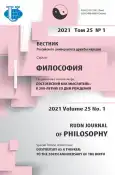Sobornost and Totality in Georges Gurvitch's Social Law Doctrine
- Авторлар: Zagirnyak M.Y.1
-
Мекемелер:
- Immanuel Kant Baltic Federal University
- Шығарылым: Том 25, № 1 (2021): DOSTOEVSKY AS A THINKER: TO THE 200TH ANNIVERSARY OF THE BIRTH
- Беттер: 130-138
- Бөлім: PHILOSOPHY. RELIGION. CULTURE
- URL: https://journal-vniispk.ru/2313-2302/article/view/324984
- DOI: https://doi.org/10.22363/2313-2302-2021-25-1-130-138
- ID: 324984
Дәйексөз келтіру
Толық мәтін
Аннотация
Georges Gurvitch (1894-1965), from the 1920s to the end of his life, was solving the problem of combining unity and plurality in the justification of society. He believed that individualism and collectivism represented social processes in a limited way because they were based on the preconception that the binding power of law derives respectively from a private or corporate actor's will. Gurvitch contrasted individual law with the social one, which was intended to overcome the opposition between individualism and collectivism. Social law bases on legal sociology's assumption that social interactions as such are already legal relations. This conclusion allows Gurvitch to consider any social interaction as a source of law and to assert legal pluralism as a way of constructing society. The integrity of the latter is a condition for the mutual correlation of the multiplicity of legal regulations generated by internal social interactions into the unified structure of social law. In a holistic approach to comprehending social interactions, Gurvitch, in his Russian-language works in the émigré period, uses the philosophical-legal interpretation of sobornost to describe society's integrity. In French- and English-language works from the 1930s, Gurvitch uses the term "totality," which he learned from Marcel Mauss, to describe social integrity. This article compares sobornost and totality as variants of denoting social integrity in Gurvitch's social law doctrine. The researcher determines that Gurvitch, using the concepts of sobornost and totality, interpreted society's development differently, 1) as anti-hierarchical sobornost equality, and 2) as a hierarchical inordination of totalities. Having analyzed the peculiarities of the interpretation of sobornost and totality in Gurvitch's works, the author concludes that these concepts should be considered multilingual equivalents in denoting communal unity as sources of law, which reflect changes in the interpretation of society in Gurvitch's social law doctrine.
Негізгі сөздер
Авторлар туралы
Mikhail Zagirnyak
Immanuel Kant Baltic Federal University
Хат алмасуға жауапты Автор.
Email: MZagirnyak@kantiana.ru
Ph.D., research fellow of Academia Kantiana, Institute for Humanities
14, A. Nevskogo str., Kaliningrad, 236041, Russian FederationӘдебиет тізімі
- Gurvitch G. Teorija istochnikov prava Ojgena Erliha i ideja socialnogo prava [Eugen Ehrlich's theory of sources of law and the idea of social law]. In: Ehrlich E. Osnovopolozhenie sociologii prava [Fundamental Principles of the Sociology of Law]. St. Petersburg: Universitetskij izdatelskij konsorcium; 2011. Р. 453-466. (In Russian).
- Zagirnyak MYu. Georges Gurvitch and Sergey Hessen on the Possibility of Forming Social Unity. Kantian Journal. 2020;39(3): 7296. doi: 10.5922/0207-6918-2020-3-4
- Gurvitch G. Ideja socialnogo prava [The Idea of Social Law]. In: Gurvitch G. Filosofija i sociologija prava: Izbrannye sochinenija [Philosophy and Sociology of Law: Selected Works]. St. Petersburg: Izdatelskij Dom S.-Peterb. gos. un-ta Izdatelstvo juridicheskogo fakulteta S.-Peterb. gos. un-ta; 2004. Р. 41-213. (In Russian).
- Le Goff J. Georges Gurvitch. Le pluralisme créateur. Paris: Michalon; 2012. 128 p. (In French).
- Gurvitch G. Dva velichajshih russkih filosofa prava Boris Chicherin i Vladimir Solovev [Two of the Greatest Russian Philosophers of Law: Boris Tchitcherin and Vladimir Soloviev]. Pravovedenie. 2005;4: 138-164. (In Russian).
- Gurvitch G. Etika i religija [Ethics and Religion]. Sovremennye zapiski [Annales contemporaines]. 1926;29: 259-283. (In Russian).
- Belov V.N., Ivleva M.L., Nizhnikov S.A. On the possibility of christian philosophy. Journal for the Study of Religions and Ideologies. 2019;18 (52):17-30.
- Gurvitch G. Buduschnost demokratii [The Future of Democracy]. Sovremennye zapiski [Annales contemporaines]. 1927;32: 326-355. (In Russian).
- Antonov M. La théorie du droit de Georges Gurvitch et ses origines philosophiques russes. Droit et société. 2016;94(3): 503-512. doi: 10.3917/drs.094.0503 (In French).
- Gurvitch G. Le concept de structure sociale. Cahiers Internationaux de Sociologie. 1955;19: 3-44. (In French).
- Gurvitch G. Marcel Mauss (1873-1950). Revue de Métaphysique et de Morale. 1950;2: 223. (In French).
- Durkheim E., Mauss M. O nekotoryh pervobytnyh formah klassifikacii. K issledovaniju kollektivnyh predstavlenij [On Some Primitive Forms of Classification: Contribution to the Study of Collective Representations]. In: Mauss M. Obschestva. Obmen. Lichnost. Trudy po socialnoj antropologii [Society. Exchange. Personality. Transactions on social anthropology]. Moscow: KDU; 2011. Р. 55-124. (In Russian).
- Mauss M. Opyt o dare. Forma i osnovanie obmena v arhaicheskih obschestvah [The Gift: Forms and Functions of Exchange in Archaic Societies]. In: Mauss M. Obschestva. Obmen. Lichnost. Trudy po socialnoj antropologii [Society. Exchange. Personality. Transactions on social anthropology]. Moscow: KDU; 2011. Р. 135-285. (In Russian).
- Gurvitch G. The Spectrum of Social Time. Dordrecht: D. Reidel Publishing Company; 1964. 152 p. doi: 10.1007/978-94-010-3623-8
Қосымша файлдар









